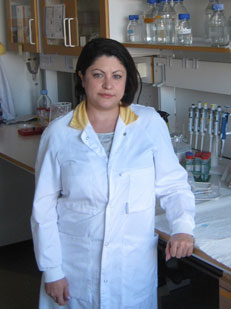Diabetes medication can reduce food intake

Rozita Anderberg, Researcher at Sahlgrenska Academy University of Gothenburg
Obesity and overweight have become a major global problem and can increase the risk of developing cardiovascular diseases and type-2 diabetes, among other problems.
Some high-calorie food can affect the brain in the same way as addictive substances like drugs and alcohol. When we eat, a feeling of well-being is created through the release of dopamine in the brain’s reward center. Overconsumption is considered to be due in part to an imbalance in this system and there is great need for effective new medicines to combat overweight.
Decrease in appetite
Recently, type-2 diabetes has begun to be treated with medications that resemble the body’s own hormone GLP-1, such as Byetta and Victoza. The hormone GLP-1 is produced naturally, both in the intestines and in the brain. After every meal, the levels of GLP-1 in the blood increase, which lead to an increase in insulin production and a decrease in appetite.
Reduce alcohol intake
A new study on rats at Sahlgrenska Academy at the University of Gothenburg shows that hormone-like medication used for type-2 diabetes can affect the brain’s reward system and reduce the need for food intake.
A follow-up study showed that this substance can also reduce alcohol intake.
“Later, we discovered that the same medication can stimulate production of interleukin 6 and interleukin 1, two important hormones that play a major role in our immune system, in the areas of the brain that control appetite. The results are increasing our understanding of how these medications can affect the brain,” says Rozita Anderberg, Researcher at Sahlgrenska Academy.
Potential new treatment
Medications resembling GLP-1 have become a potential new treatment for obesity and these findings can be of major clinical significance.
“Our data can make an important contribution to the understanding of these mechanisms,” says Rozita Anderberg, Researcher at Sahlgrenska Academy.
For additional information, feel free to contact:
Rozita Anderberg, Researcher at Sahlgrenska Academy
+46 761 64 76 66
rozita.anderberg@neuro.gu.se
http://sahlgrenska.gu.se/english/research/news-article//diabetes-medication-can-…
Media Contact
All latest news from the category: Health and Medicine
This subject area encompasses research and studies in the field of human medicine.
Among the wide-ranging list of topics covered here are anesthesiology, anatomy, surgery, human genetics, hygiene and environmental medicine, internal medicine, neurology, pharmacology, physiology, urology and dental medicine.
Newest articles

A universal framework for spatial biology
SpatialData is a freely accessible tool to unify and integrate data from different omics technologies accounting for spatial information, which can provide holistic insights into health and disease. Biological processes…

How complex biological processes arise
A $20 million grant from the U.S. National Science Foundation (NSF) will support the establishment and operation of the National Synthesis Center for Emergence in the Molecular and Cellular Sciences (NCEMS) at…

Airborne single-photon lidar system achieves high-resolution 3D imaging
Compact, low-power system opens doors for photon-efficient drone and satellite-based environmental monitoring and mapping. Researchers have developed a compact and lightweight single-photon airborne lidar system that can acquire high-resolution 3D…





















